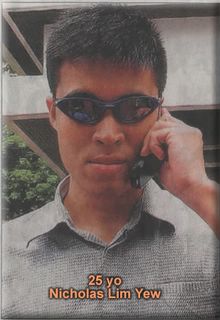Tak kan Melayu Hilang Di Dunia
| takkan melayu hilang di dunia | Posted by eufemisme Sunday, May 02, 2004 @ 2:15 PM |
| Full Text: |
| Ah yes, the ever popular line by Hang Tuah that ceases to fade even up till this day, proudly glistening at the very hearts of every Malay. But do we ever stop to question the relevance of such a proselytising phrase in today's society? Could Hang Tuah's statement actually be exclusively time-stamped? I remember stumbling upon a chinese children's variety show on the morning of the eve of Hari Raya, and decided to stick to it after realising they were talking about the Eid celebrations here in singapore. No, I do not watch such things because it fascinates me that other races are talking about my traditions and customs, but rather, I prefer watching such shows with a sceptical eye, paying close attention to what they're saying, in fear of misrepresentations of facts. I guess that's the advantage of understanding another language - experience has taught me that it's the perfect weapon to yield when these other races are looking down on us, or simply talking behind our backs in their native language, oblivious to the fact that ceke malai ren ke yi ming pai huayi (this malay person can understand mandarin). Anyway, here's the lowdown of the show... the good: The producers chose the right Malay houshehold to visit, one where the mother was able to provide succinct answers to ever-popular questions regarding the practice of fasting in the holy month of Ramadhan. Chinese girl: What is the significance of fasting for one month? Muslim mother: It's for spiritual, moral, and physical purification. And why is this answer so important? This is simply because many non-Muslims, especially the local Chinese, think that Eid marks a new year for the Muslims (drawing a parallel to their own celebration of Chinese New Year). And why do I express relief for the right choice of Muslim household? Because just the preceding week, I had the misfortune of listening to a Malay-Muslim caller of an English radio station saying that her New Year is coming, obviously referring to Eid. Even if the rest of the non-Muslim society here thinks it's our New Year, why do we have to follow suit and conform to their beliefs, rather than setting the matter straight once and for all? We are all but ambassadors of our religion and our race, each carrying an emblem of faith across our hearts, and we must play our part in placing Islam in the correct light. Here we are exclaiming disbelief at the media's misrepresentations of our religion and its practices, and there we go, arms folded, with one eye closed, simply shaking our heads, but not clearing any misconceptions whatsoever. the bad: As expected, one of the greatest symbols or aspects of Eid celebrations for the Malays here is the ketupat (the Malay version of rice dumplings). And of course, the show portrayed a Malay auntie not only demonstrating, but teaching the three Chinese girls the art of weaving a ketupat. She even made it a point for the girls to make at least two on their own, to ensure that the skill had been successfully passed on. So, what is so bad about this? One might argue, isn't it good that we're allowing other races to have a taste of our culture, so as to promote racial harmony and social cohesion? True, while I do not deny the fact that this is a vital step in the proselytisation of racial unity, an integral aspect of a nation, there are several down-sides of it that the Malay community here still seem to overlook. Just count the number of authentic Malay aspects of tradition, customs, food, and even clothing we have left. It is due to this very trait of generosity and naivety of the Malays in spreading their heritage and customs that we find ourselves, our traditions, being swept away in a world of vague familiarity. Never before have I seen so many authentic Malay food or kuehs deemed under the category of Peranakan food. Even our clothings have become widely known as being Peranakan, by some stroke of luck. Our everyday dishes like epok-epok,nasi lemak, and many others have undergone a radical evolution to incorporate haram ingredients like pork (Astarghfirullah'alazim), all thanks to the innovation of the non-Muslims here. And yet, we still fail to see the big picture, that of the other races eating off our very own rice bowls. Why do we insist on sharing a plate with them, when we are not promised another plate in return? Why do we insist on sharing our bowl with them knowing it's the only prized possession we have left, and that this treasure will simply be pulled away from us, slowly but surely? I'm not saying that it is most definitely a mistake to share recipes, among other ethnic trade secrets, so to speak, with other communities. By all means, it may perhaps be the only though-of remedy for creating a cohesive multi-racial society. But let us not be real-life examples of the saying "yang dikejar tak dapat, yang dikandung berciciran". Let us not give all of ourselves till we are left with nothing we can call our own. Here we are smiling for the cameras as we place one hand on our plate, and the other on the shoulders of our neighbours, and there they go, with one hand on our plate, and the other busy, scrambling, secretly writing their names on the underside of the plate, claiming authority. Takkan Melayu hilang di dunia - I shudder at the prospects of that line today...
|





